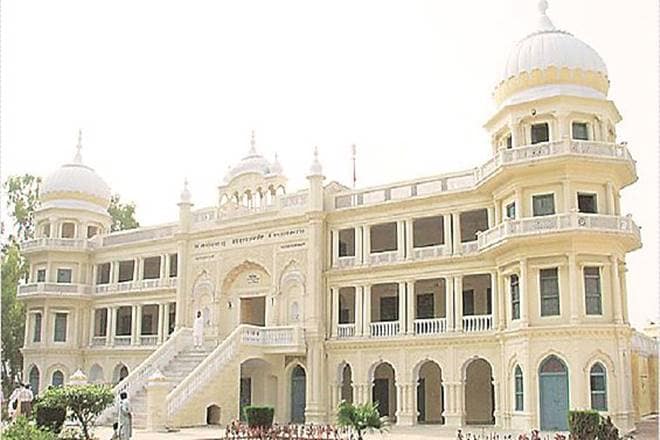A day after Pakistan and India announced they would develop a pilgrim corridor, on both sides of the border, to Gurdwara Darbar Sahib Kartarpur, fresh strain emerged in bilateral ties with New Delhi accusing Islamabad of harassing its diplomats and denying access to Indian pilgrims visiting gurdwaras Nankana Sahib and Sacha Sauda Sahib in Pakistan.
Lodging a strong protest Friday and expressing “grave concern”, India accused Pakistan of promoting “secessionist tendencies” and produced photographs and videos of pro-Khalistan posters at these gurdwaras. South Block sources said these were shared as evidence with the Pakistan High Commission and officials of the Foreign Ministry.
One of the photographs shows Pakistan SGPC general secretary Gopal Singh Chawla, who is said to have met Lashkar-e-Taiba chief Hafiz Saeed, preventing Indian diplomats from meeting pilgrims at Nankana Sahib — The Indian Express reported Friday that Indian diplomats were being prevented from meeting Indian pilgrims at Nankana Sahib.
Also read: BJP becomes biggest TV advertiser ahead of polls; beats all these big brands
“An Indian consular team was stopped by Pakistani security officials for the third consecutive time today at Nankana Sahib. They were stopped from performing their diplomatic duties, even harassed,” sources said. On the other hand, India, sources said, allowed a team of the Pakistan High Commission well as their High Commissioner to visit and meet Pakistani pilgrims headed to Piran Kaliyar Sharif, the dargah of Sufi saint Alauddin Ali Ahmed Sabir Kalyari near Haridwar.
“While on the one side, Pakistan is trying to show its human face by allowing Indian pilgrims, on the other side it is promoting secessionist tendencies in India. It is openly inciting communal harmony and secessionist tendencies as can be seen from the number of posters, statements and procession with Khalistan flags today at Nankana Sahib,” sources said.
This comes a day after Islamabad responded within hours to a New Delhi request for a corridor to Kartarpur Sahib, allowing Sikh pilgrims to visit the shrine, the final resting place of Guru Nanak Dev. This was being read as the first signs of a thaw in India-Pakistan relations that plummeted to a new low two months ago when a meeting of Foreign Ministers was cancelled and positions hardened on both sides.
On Friday, the Ministry of External Affairs, lodging a “strong protest” with the Pakistan government, said that “despite having been granted prior travel permission by the Ministry of Foreign Affairs of Pakistan, Consular officials of the High Commission of India in Islamabad were harassed and denied access on November 21 and 22 at Gurudwara Nankana Sahib and Gurudwara Sacha Sauda to Indian pilgrims visiting Pakistan under the bilateral protocol”.
Also read: This state tops list of highest number of development projects; check top 10 states
“As a result of such harassment, they were compelled to return to Islamabad without performing their diplomatic and consular duties vis-a-vis Indian pilgrims,” the MEA said in a statement. “We have shared our grave concern that this is the third consecutive visit of Indian Sikh pilgrims when Pakistan has prevented Indian High Commission officials from meeting the visiting Indian nationals on the pretext of security in order to deflect attention from Pakistan’s violation of international legal instruments and conventions like the Vienna Convention on Diplomatic Relations, 1961 and the Vienna Convention on Consular Relations, 1963,” it said.
This was also a breach of the letter and spirit of the 1974 Bilateral Protocol on visit to religious shrines and the Code of Conduct for the treatment of diplomatic/consular personnel in India and Pakistan, 1992.
“We have also expressed grave concern at the reports of attempts being made during the ongoing visit of the Indian pilgrims to Pakistan, to incite communal disharmony and intolerance and promote secessionist tendencies with the objective of undermining India’s sovereignty and territorial integrity,” it said, referring to posters of a “Sikh referendum in 2020” at the gurdwaras in Pakistan.
It said Pakistan has been called upon to take all measures to “not allow its territory to be used for any hostile propaganda and support for secessionist tendencies” against India in keeping with the commitments made under the Simla Agreement, 1972 and endorsed in the Lahore Declaration, 1999.

